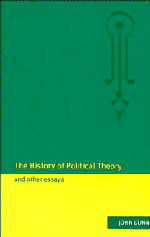Book contents
- Frontmatter
- Contents
- Preface
- Acknowledgements
- 1 Introduction
- 2 The History of Political Theory
- 3 Contractualism
- 4 Political obligation
- 5 Trust
- 6 The claim to freedom of conscience: freedom of speech, freedom of thought, freedom of worship?
- 7 Property justice and common good after socialism
- 8 The dilemma of humanitarian intervention: the executive power of the Law of Nature, after God
- 9 Specifying and understanding racism
- 10 Political science, political theory and policy making in an interdependent world
- 11 Democracy: the politics of making, defending and exemplifying community: Europe 1992
- 12 Is there a contemporary crisis of the nation state?
- 13 Political and economic obstacles to rapid collective learning
- 14 The heritage and future of the European left
- Index
6 - The claim to freedom of conscience: freedom of speech, freedom of thought, freedom of worship?
Published online by Cambridge University Press: 05 February 2010
- Frontmatter
- Contents
- Preface
- Acknowledgements
- 1 Introduction
- 2 The History of Political Theory
- 3 Contractualism
- 4 Political obligation
- 5 Trust
- 6 The claim to freedom of conscience: freedom of speech, freedom of thought, freedom of worship?
- 7 Property justice and common good after socialism
- 8 The dilemma of humanitarian intervention: the executive power of the Law of Nature, after God
- 9 Specifying and understanding racism
- 10 Political science, political theory and policy making in an interdependent world
- 11 Democracy: the politics of making, defending and exemplifying community: Europe 1992
- 12 Is there a contemporary crisis of the nation state?
- 13 Political and economic obstacles to rapid collective learning
- 14 The heritage and future of the European left
- Index
Summary
It is certainly easier to see the religious outcome of William of Orange's accession to the throne of England as an abatement in the practice of persecution than as a firm espousal of the principle of tolerance. There remains ample disagreement about the implications of this aspect of the Revolution settlement; but there is relatively little dispute at present about its causes. Jonathan Clark, for example, has recently insisted at some length that the Revolution of 1688 left England as still very much an ancien regime, its national society firmly framed by a state founded upon the political privileges of its first two estates: the clergy of its state church and a landed aristocracy (Clark 1985,1986). How much real light is shed by this comparison, either on the nature of English society itself or on the societies of Europe's absolutist monarchies, is eminently contestable (cf. esp. Innes 1987). But there is at least a measure of demythologizing astringency to the claim that post-Revolution England was every bit as much a confessional state as France had been during the protracted interval between the issuing and Revocation of the Edict of Nantes. In contrast with these residual ideological provocations, however, recent historians seem relatively united in their interpretations of the pressures that determined the form of the Revolution's religious settlement: a series of unelevated and provisional political solutions to what were plainly seen as delicate and highly immediate political problems.
- Type
- Chapter
- Information
- The History of Political Theory and Other Essays , pp. 100 - 120Publisher: Cambridge University PressPrint publication year: 1995
- 1
- Cited by



